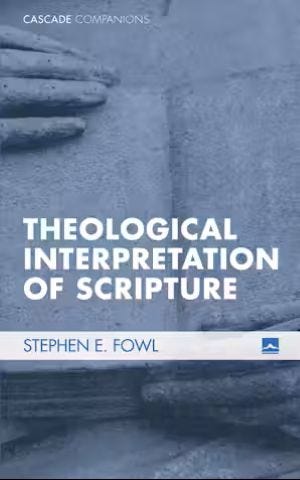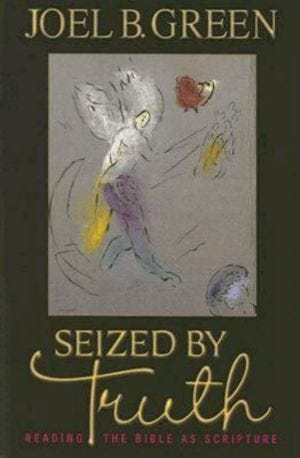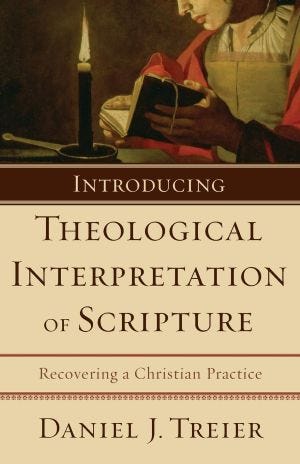Theological Interpretation of Scripture Matters—1
Start Here
It’s not too much to say that theological interpretation of Scripture has been the primary way of reading the Christian Bible throughout its history—though, of course, this would not characterize academic reading of the Bible in the Modern Period. In this series of posts, I will be providing several annotated bibliographies designed to orient anyone interested in the theological interpretation of Scripture to its interests and practices.
What Is Theological Interpretation?
How best to describe the theological interpretation of Scripture? Not everyone will agree on a single definition, but this relates more to emphasis and nuance than to the idea that the nature of this interpretive approach is contested or hotly debated.
Theological interpreters read the Bible as a sacred text within the context of faith communities. Typically, they explore the Bible’s unity across testaments, read texts canonically, and are concerned with the role of Scripture in the faith and formation of persons and ecclesial communities. Theological interpretation of Scripture refuses the reduction of the Bible to a disparate collection of historical and/or literary documents, turning to it instead as a source of divine revelation and an essential partner in the task of theological reflection. To push further, theological interpretation is concerned with encountering the God who stands behind and is mediated in Scripture. (I am adapting from Joel B. Green, “Rethinking ‘History’ for Theological Interpretation,” Journal of Theological Interpretation 5, no. 2 [2011): 159–74; https://doi.org/10.2307/26421422.)
Interested in an Orientation?
Here are three works (in alphabetical order) to get you started.
Stephen E. Fowl, Theological Interpretation of Scripture, Cascade Companions (Eugene, OR: Cascade, 2009). ISBN: 9781556352416. 108 pp.
Due to its relative brevity and surprising breadth of coverage, this is an ideal primer for the contemporary theological interpretation movement. Fowl, a New Testament scholar and theologian, was a key, early figure in the rise of interest in theological interpretation, beginning in the 1990s, and remains influential today. This introductory text explores the status and nature of Scripture, the relation of theological interpretation to other theological concerns, and characteristic habits and practices of theological interpreters, as well as charts something of the future of the movement. A final chapter identifies and discusses some of the key contributors to the movement.
Joel B. Green, Seized by Truth: Reading the Bible as Scripture (Nashville: Abingdon, 2007). ISBN: 9780687023554. 185 pp.
For Green, a New Testament scholar and theologian, approaching the Bible as Scripture entails our taking seriously the claim that the Bible is the church’s Book. We are not reading someone else’s mail—as though reading the Bible has to do primarily with recovering an ancient meaning intended for someone else and then translating its “principles” for contemporary use. When we recall that we are the people of God to whom the Bible is addressed as Scripture, we realize that the fundamental transformation is not the translation of an ancient message into a contemporary meaning, but rather the transformation of our lives by means of God’s Word. This means that reading the Bible as Scripture has less to do with what tools we bring to the task, however important these may be, and more to do with our own dispositions as we engage with Scripture.
Daniel J. Treier, Introducing Theological Interpretation of Scripture: Recovering a Christian Practice (Grand Rapids: Baker Academic, 2008). ISBN: 9781441210654. 222 pp.
Treier, a systematic theologian at Wheaton College, positions his introduction as an attempt to recover an ancient practice, what we tend to call premodern interpretation, before sketching the formative roles of Christian doctrine and listening to the community of the Spirit. The second major section of the book examines ongoing challenges, including relationships between theological interpretation and biblical theology, general hermeneutics, and the importance of social location.
Bonus Recommendations
Here are some articles that provide helpful orientation to the theological interpretation of Scripture:
S. A. Cummins, “The Theological Interpretation of Scripture: Recent Contributions by Stephen E. Fowl, Christopher R. Seitz and Francis Watson,” Currents in Biblical Research 2 (2004): 179–96.
Richard B. Hays, “Reading the Bible with Eyes of Faith: The Practice of Theological Exegesis,” Journal of Theological Interpretation 1 (2007): 5–21.
R. W. L. Moberly, “What Is Theological Interpretation of Scripture?” Journal of Theological Interpretation 3 (2009): 161–78.
Kevin J. Vanhoozer, “What Is Theological Interpretation of the Bible?” in Dictionary for Theological Interpretation of the Bible, ed. Kevin J. Vanhoozer (Grand Rapids: Baker Academic, 2005), 19–25.





Thanks for sharing, Joel! Any shareable opinions on Vanhoozer’s recent Mere Christian Hermeneutics along the TIS scholarly developments?